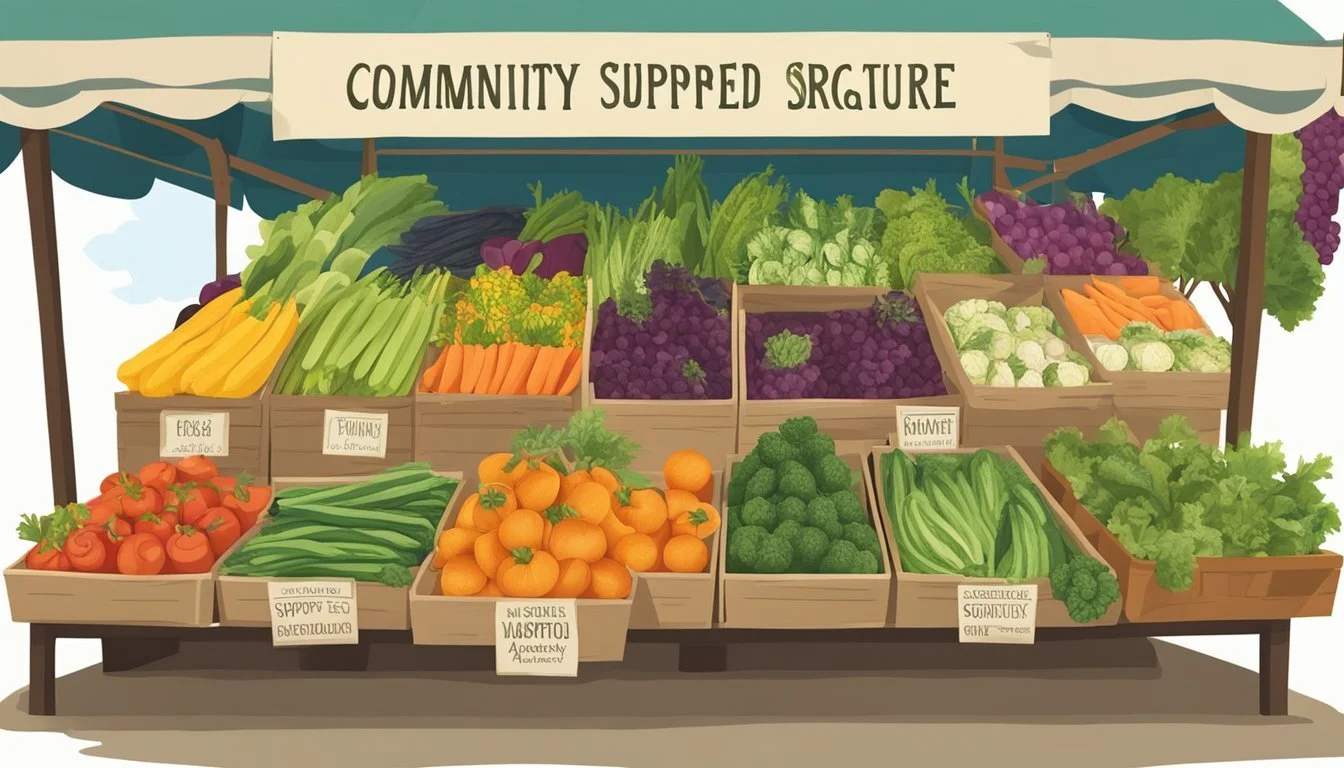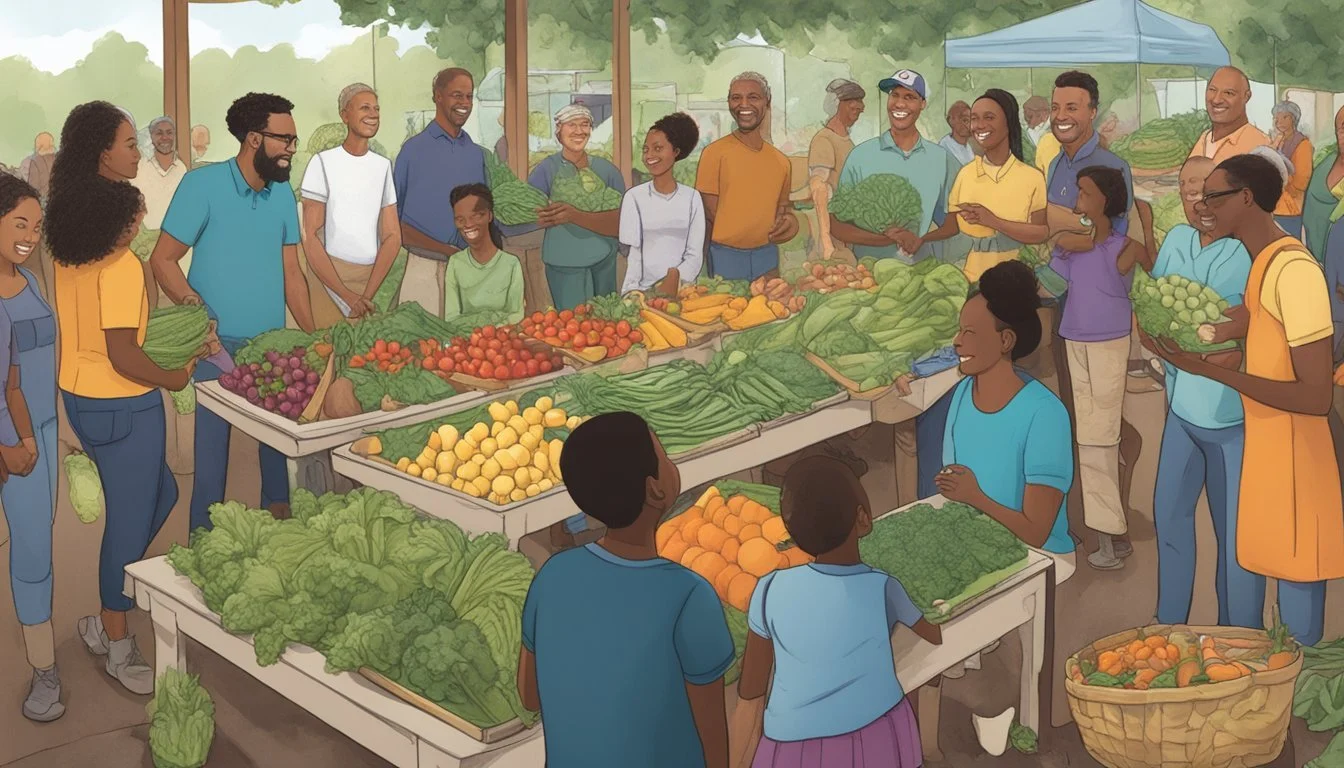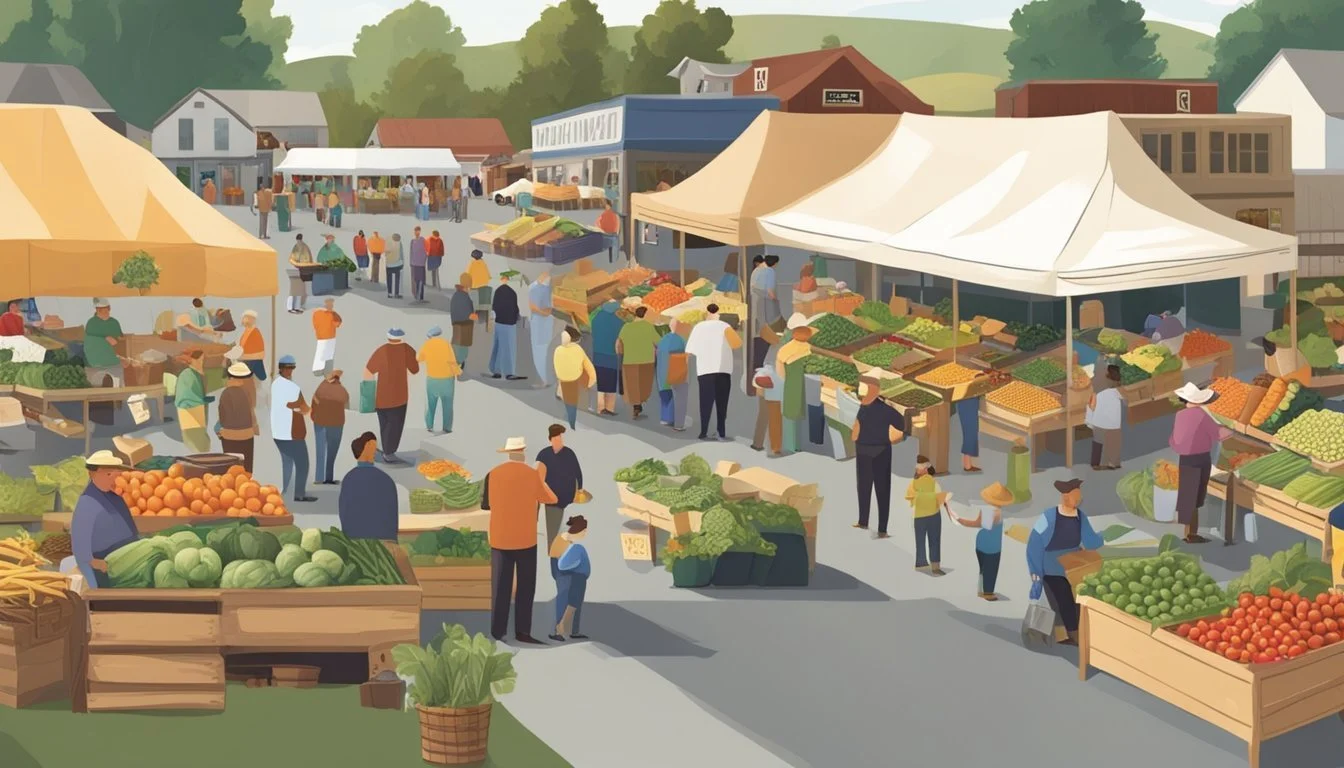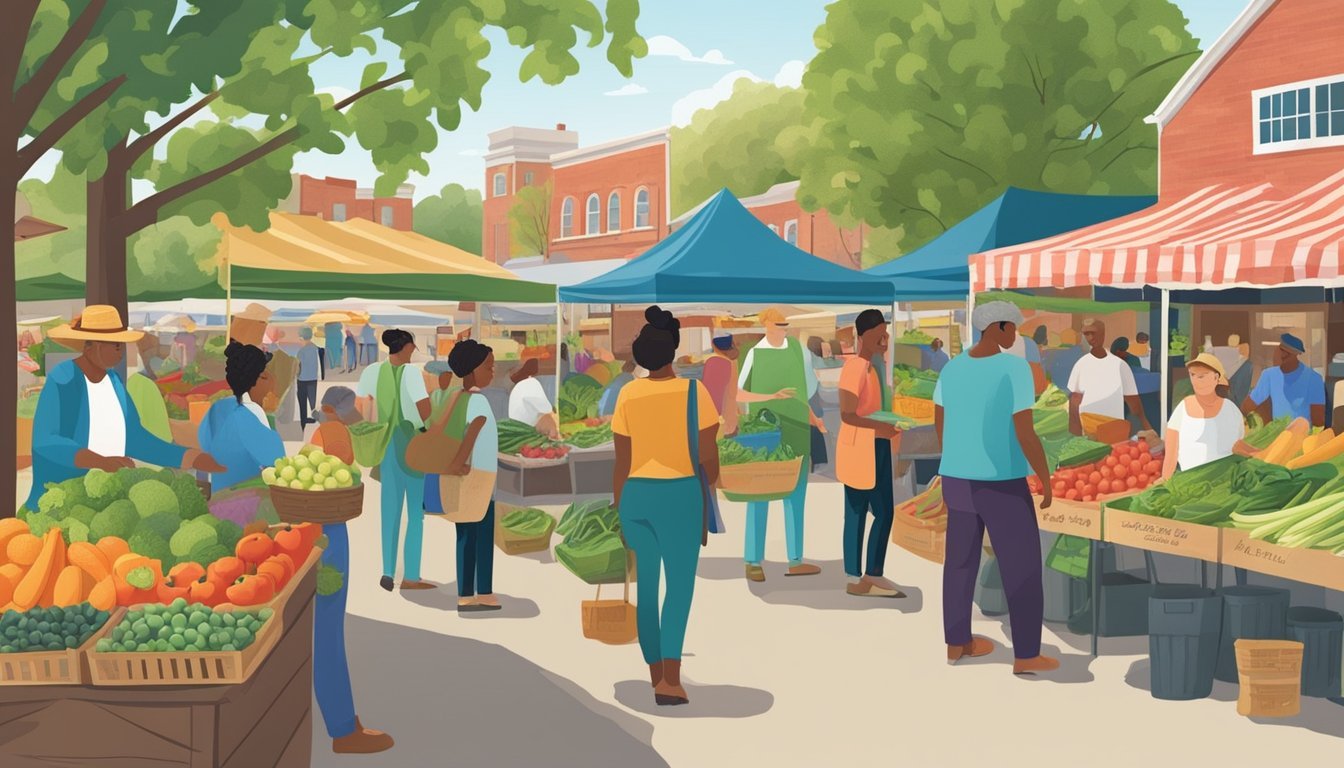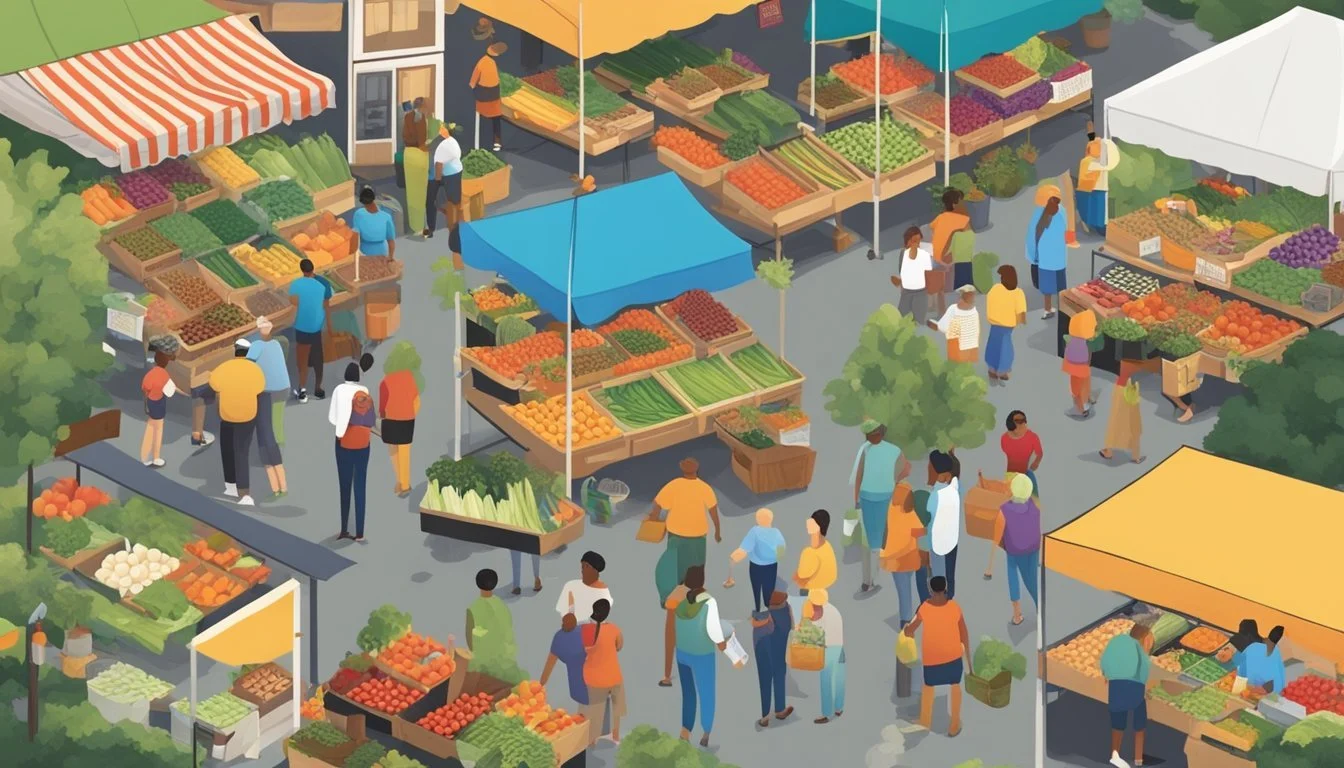Community Supported Agriculture (CSA) in Kentucky
A Guide to Local Farm Partnerships
Community Supported Agriculture, commonly abbreviated as CSA, is a flourishing practice in Kentucky that connects residents directly with local farms. The CSA model entails individuals purchasing a share of the farm's harvest in advance, which in turn provides them with a weekly or bi-weekly supply of fresh, seasonally appropriate produce. This framework not only fosters a vested interest in local agriculture but also underpins a sustainable food system that benefits both consumers and producers.
In Kentucky, this symbiotic relationship has been encouraged through various programs aiming to enhance workplace wellness and community health. By integrating CSAs into employee wellness programs, businesses are playing a pivotal role in promoting nutritious food choices while supporting the state's agricultural economy. Throughout the state, from small-scale organic farms to larger agricultural operations, CSA programs are tailored to fit different household needs, offering full or mini shares sized for individual consumers or families.
The commitment to local sourcing and eating is evident in Kentucky's embracing of CSA programs, with a wide array of farms providing fresh, locally-grown produce to their communities. The Kentucky Proud designation bolsters this movement by highlighting products produced within the state, fostering a deeper connection between Kentucky residents and the farmers who feed them. Through such community engagement, CSAs in Kentucky are not just reshaping food consumption patterns but are also strengthening the local economies and environmental sustainability initiatives.
Understanding CSA
Community Supported Agriculture (CSA) in Kentucky connects consumers directly with local farmers through pre-purchased shares of produce, fostering a mutually beneficial relationship.
Concept and Origin
Community Supported Agriculture, or CSA, is a model that began in the United States in the mid-1980s, with the first known CSA farms appearing in Massachusetts. The concept quickly spread, reflecting a growing interest in sustainable agriculture and local economies. By the early 2000s, CSA had become significantly more popular among both producers and consumers, exemplified by the growth to as many as 6,000 CSA farms by 2009.
How CSA Works
In a CSA, members purchase shares of a farm's expected harvest in advance of the growing season. This upfront commitment provides farmers with early-season capital and a guaranteed market for their produce. Shareholders typically receive a weekly or bi-weekly box of fresh, seasonal produce throughout the farming season, which in Kentucky typically runs from May to October.
Purchase: Members buy shares before the season starts.
Receive: Shareholders collect their fresh produce on a regular schedule.
Support: Members share in the risk and reward of the farming season alongside the farmer.
Benefits of CSA Membership
Members of a CSA enjoy numerous advantages, reinforcing not just health and nutrition but also contributing to social and ecological well-being.
Freshness: Produce is delivered at peak freshness, often harvested within 24 hours of distribution.
Variety: Shareholders experience a range of produce throughout the season, including some items not commonly found in regular supermarkets.
Community: Members gain a sense of connection with the land and the people who grow their food.
Support: Local economies benefit from the direct financial support to farmers, enhancing sustainability.
By participating in community supported agriculture, members play an active role in their local food systems and often develop a deeper appreciation for farming processes and challenges.
CSAs in Kentucky
Community Supported Agriculture in Kentucky offers residents an opportunity to directly engage with local farmers, ensuring access to fresh, locally-grown produce. As part of the Kentucky Proud program, residents can participate in CSAs and support their local community and agriculture.
Kentucky Proud Program
The Kentucky Proud designation is a marker of locally produced products and is heavily integrated with the CSA system in the state. With over 70 members participating in CSAs under this program in 2023, Kentucky residents have a robust list of options for pre-purchasing food from local farmers. The Kentucky Proud CSA Directory is a resource designed to connect consumers with CSA farms, reinforcing local economic growth and sustainability within the agriculture community.
KY Farm Share Coalition
The KY Farm Share Coalition advocates for workplace wellness through a CSA program. They highlight that the vegetable CSA season in Kentucky generally spans 21-22 weeks, from May to October. CSA offerings range in size to cater to different household needs:
Full/Regular shares: Sufficient for 2-4 people
Small/Mini shares: Suitable for 1-2 people
This coalition has been successful in bridging the gap between local farmers and consumers, fostering a supportive community around agriculture.
Local CSA Farms
In Kentucky, an assortment of local CSA farms allows residents to subscribe to regular deliveries of farm produce. These farms provide a diverse selection of products beyond vegetables, including meat, eggs, and value-added products. For instance:
Lexington area CSA farms: Cater to local demand with a variety of subscription options.
Three Springs Farm: Acknowledged as central Kentucky's longest-running CSA farm, operating since 1999 and utilizing sustainable farming methods.
Farms near the Natural Bridge area: Offer picturesque local produce while supporting small family-owned farming operations.
By choosing a CSA, Kentuckians contribute to the viability of local farms and embrace a share of the agricultural cycle in their community.
Membership and Support
In Kentucky, joining a Community Supported Agriculture program as a member connects individuals directly to local farms. Members support these farms financially and, in return, receive regular deliveries of fresh produce. Access to such programs is facilitated through various share types and costs, and the support from the community plays a vital role in the funding and continuity of these farms.
How to Become a Member
To become a member of a CSA program in Kentucky, individuals typically sign up through a participating farm or coalition's website. The sign-up process may involve choosing the type of share they wish to receive and selecting a preferred delivery or pick-up location. Payment, which can range from partial to full, is generally required upfront to provide the farms with the necessary capital to operate.
Share Types and Costs
CSA programs in Kentucky offer different share sizes to meet diverse household needs and budgets. Here is an outline of common share types and associated costs for a season:
Full/Regular shares: Approximately \$616-\$704 (~\$28-\$32 per week)
Small/Mini shares: Approximately \$462-\$506 (~\$21-\$23 per week)
Note: Actual costs may vary based on farm offerings and the length of the delivery season.
Members can choose based on the volume of produce they expect to consume weekly. Some farms also offer meat, eggs, and other farm products as part of their share options.
Support and Funding
Community members' upfront payments into the CSA program act as a form of support and funding for farmers. This model assists farmers in planning for the season's expenses, allowing them to invest in farming operations and ensures financial security. Furthermore, members often form a connection with their farmers, reinforcing the shared risks and benefits while maintaining agricultural sustainability and local food systems.
Agricultural Practices
In Kentucky's agricultural sector, farming practices adhere to diverse methodologies ranging from organic to conventional systems, each with its own environmental impacts and inherent seasonal challenges.
Organic vs. Conventional
Organic farming in Kentucky depends on maintaining ecological balance through natural inputs and processes. Producers opting for organic practices refrain from using synthetic pesticides and fertilizers. They focus on long-term soil health and employ crop rotation, compost, and green manure to nurture their fields. Conventional farming methods, in contrast, often rely on chemical inputs and advanced technology to increase crop yields and manage pests and diseases. Farmers managing conventional systems can implement a mix of methods to enhance production efficiency, including the use of non-organic pesticides and genetically modified seeds.
Environmental Impact
The environmental impact of agricultural practices is significant in Kentucky's farming landscape. Sustainable agriculture practices seek to mitigate negative impacts through conservation and responsible use of resources. Water management is critical, especially in preserving water quality, where farmers practice careful irrigation techniques to prevent runoff and conserve water. Diverse crop choices and protective land management aim to safeguard against soil erosion and biodiversity loss. Farmers in Kentucky acknowledge the importance of sustainable practices that contribute positively to the local ecosystem and reduce the carbon footprint.
Seasonal Challenges
Kentucky's growing season presents a variety of challenges for farmers, including unpredictable weather patterns and pest pressures. Producers must choose seeds that not only align with their farming methodology, whether organic or conventional but also are well-suited to Kentucky's climate. They must plan sowing and harvesting according to the local weather conditions to minimize risk. Adequate water availability is essential throughout the growing season, compelling farmers to employ strategies like drip irrigation during dry spells to ensure that crops receive the necessary hydration for optimal growth.
Community and Health Benefits
In the heart of Kentucky, Community Supported Agriculture (CSA) programs are much more than a source of fresh produce; they are catalysts for enhanced community health and stronger local food systems.
Nutritional Advantages
Community Supported Agriculture provides a direct channel for consumers to access fresh, locally grown fruits and vegetables, leading to improved dietary habits. Clinical research suggests that being part of a CSA can have tangible health benefits, potentially improving the long-term health of participants by encouraging consumption of a variety of fresh foods.
Variety of Produce: CSA members receive a diverse range of seasonal produce, which introduces them to new ingredients and encourages a balanced diet.
Freshness and Taste: The proximity of farm to table means that produce retains more nutrients and flavor, making healthy eating a more enjoyable experience.
Food Security and Access
CSAs play a vital role in improving food security by ensuring that community members have regular access to fresh foods. They also provide financial benefits to members by offering savings on food purchases and contributing to a reduction in diet-related medical expenses.
Affordability: For every dollar spent on CSA vouchers, studies indicate significant savings on diet-related health costs.
Consistent Access: Regular CSA deliveries guarantee that members have steady access to healthy food, influencing positive cooking and eating patterns.
Social Impact
The CSA model fosters a unique connection between local farmers and the community, strengthening the local economy and creating a shared commitment to health and sustainability.
Support for Local Farmers: By pre-purchasing seasonal shares, community members provide farmers with stable revenue, which can help in planning and sustaining their operations.
Community Engagement: Individuals involved in CSAs often report a sense of belonging and mutual support that comes with being part of a shared endeavor focused on health and wellness.
Through participation in CSA programs, Kentuckians gain nutritional advantages, enhanced food security, and contribute positively to their local communities.
Economic Aspects
Community Supported Agriculture (CSA) in Kentucky plays a crucial role in the state's agricultural economy, providing farmers with a stable income source and contributing to the local economy through direct sales.
Understanding CSA Economics
The CSA model is a subscription-based system where consumers purchase shares of a farm's harvest in advance. This financial arrangement benefits producers by ensuring a consistent market and upfront capital to cover early season costs. In Kentucky, the CSA model has enabled farms to tap into the direct market, selling shares to consumers that correspond with a season's worth of produce. The advance payments effectively create a cash flow that can be instrumental in farm planning and operations.
Financial Planning for Farmers
For farmers, effective financial planning is integral to CSA success. A portion of share cost is usually required upfront, which can provide farms with guaranteed working capital for the year. For example, in Kentucky, full CSA shares may range from $616-$704 for the season equating to $28-$32 per week, whereas smaller shares cost $462-$506, indicating a $21-$23 weekly rate. This immediate capital allows for better management of resources and helps in strategizing for a profitable season. It also mitigates the risk associated with yield uncertainty due to factors like weather conditions.
Economic Impact on Communities
From an economic standpoint, CSAs have a significant impact on local communities. Direct sales from farmers' markets, on-farm retail, and CSA contribute to keeping the money within the local economy. These purchase methods can also foster relationships between producers and consumers, strengthening community bonds. Kentucky's specialty-crop sales through direct markets have maintained strong despite price fluctuations and inflation challenges. The integration of CSAs into the local marketplaces contributes potentially to over $226 million circulating within the state's local economy, which can be seen as an investment in agricultural sustainability and community health.
Risks and Considerations
Community Supported Agriculture in Kentucky, like any agricultural model, comes with inherent risks and considerations. These factors are crucial as they affect both producers and consumers in a system where both parties share in the benefits and responsibilities.
Weather and Crop Risks
Farmers face the uncertainty of weather patterns that can drastically affect crop yields. In Kentucky, weather volatility means CSA members must understand the potential for fluctuations in their share of the harvest. Weather events, such as early frosts, droughts, or excessive rainfall, can damage crops and diminish the expected output. The relationship between farmers and CSA members is built on the premise that risks are shared, and there could be seasons with bountiful harvests as well as lean times.
Mitigating Financial Risk
Financial risk is a significant consideration for both CSA farmers and their partners. Farmers require security in their financial planning, while consumers seek assurance in their investment. To mitigate such risks, CSA members typically pay for their shares in advance, providing farmers with a much-needed infusion of capital at the start of the season. This model fosters a relationship where consumers become partners in the farming operation, sharing both in the costs of farm inputs and the rewards of the harvest. The advanced payment acts as a buffer, securing funds for the farmer while members accept the inherent risks of agricultural production.
Promotional Strategies
Community Supported Agriculture (CSA) in Kentucky utilizes targeted promotional strategies to market CSA shares and establish collaborations with local businesses. Effective marketing and partnerships are key to expanding their reach and securing a committed customer base.
Marketing CSA Shares
CSA programs in Kentucky engage potential customers through a variety of marketing efforts. They use email campaigns and blogs to provide updates from the farms and spotlight the benefits of being a CSA member. Through these channels, they can directly communicate with their community, share recipes, and highlight the value of fresh, locally-sourced produce. Websites serve as a central platform for information and often include easy-to-navigate sign-up options. Leveraging social proof, CSA programs also encourage current members to share their experiences, further helping to promote the program.
Utilization of a Multi-Channel Approach:
Email: Personalized newsletters, subscription information, and member testimonials.
Blog: Educational content on the importance of supporting local agriculture.
Website: User-friendly sign-up forms, program details, and contact information.
Collaboration with Businesses
Businesses play a significant role in the promotion of CSAs in Kentucky by hosting Workplace CSA programs. These collaborations allow employees to receive fresh produce directly at their place of employment, simplifying the logistics for consumers. It also demonstrates an employer's commitment to supporting local agriculture and providing healthy options for their workforce. CSA providers may offer presentations or informational booths at partnering businesses to educate and engage potential shareholders.
Workplace CSA Integration:
Employers: Acting as points of distribution and promotion within the workplace.
Promotion: Interactive presentations and informative displays at business locations.
Additional Products
Community Supported Agriculture (CSA) in Kentucky is not just limited to vegetables but spans a variety of other farm-fresh products. This diversification offers CSA shareholders a holistic approach to local agriculture.
Expanding Beyond Vegetables
Kentucky's CSA programs have grown to include a range of meat and eggs, supporting a well-rounded diet. These often include:
Poultry: Chicken and turkey options, typically free-range and antibiotic-free.
Beef and Pork: Grass-fed or grain-finished, depending on the farm.
Eggs: Often from free-roaming hens, providing a richer flavor profile.
CSA shares often pair these proteins with traditional vegetable offerings, expanding the nutrition and variety available to consumers.
Local Artisan Goods
Artisanal products, crafted by skilled local producers, add unique value to Kentucky's CSA shares. These may include:
Flowers: Fresh bouquets that bring seasonal beauty.
Fruit: From succulent strawberries to crisp apples, reflective of the season's bounty.
Fruit Jams and Preserves: A sweet taste of Kentucky's orchards.
Baked Goods: Pastries or bread made from locally sourced grains.
Through these additions, CSA subscribers receive a comprehensive selection of fresh food while supporting their local community.
Consumer Engagement
In Kentucky's Community Supported Agriculture (CSA) scene, consumer engagement takes the shape of active participation and integration into the local food system. Shareholders engage by making the most of their weekly share through cooking and community involvement.
Using CSA Produce
Consumers often receive a weekly share that may include an array of vegetables, fruits, meats, eggs, and herbs. To make effective use of the fresh produce, shareholders typically invest in essential kitchen equipment such as quality knives, cutting boards, and storage containers. They learn to be flexible with their meal planning, adapting to the diverse offerings of the season.
Engaging with the CSA Community
Being part of a CSA means more than just getting food; it's about joining a community. Shareholders have the opportunity to visit farms, meet local farmers, and learn about sustainable agriculture firsthand. Through these interactions, consumers deepen their understanding and appreciation of where their food comes from.
Recipe Sharing and Cooking Tips
The CSA community thrives on sharing - from recipes that highlight the seasonal produce to cooking tips that help members tackle unfamiliar ingredients. Members gain confidence in their cooking skills and often share their discoveries in newsletters or online platforms, helping each other to make the most of their CSA experience.
Communication and Feedback
Effective communication and feedback mechanisms are crucial for the success of Community Supported Agriculture (CSA) programs in Kentucky. By fostering transparency and responsiveness, farmers can strengthen customer relationships and enhance the quality of their service.
Maintaining Customer Relationships
Farmers prioritize consistent communication with customers to keep them informed about the CSA's offerings and operations. Regular updates about the season's crops, delivery schedules, and any changes are disseminated through emails, newsletters, or social media. This open line of communication ensures customers feel connected to the process and appreciated for their support. In turn, customers are encouraged to share their preferences and concerns, which helps farmers tailor their services to meet customer needs.
Gathering and Implementing Feedback
Feedback is an invaluable tool for CSA farmers to refine their offerings and customer service. Farmers often solicit feedback through:
Surveys: Conducted periodically to gauge customer satisfaction and gather suggestions.
Direct Communication: Encouraged at pick-up points or through dedicated customer service channels.
Social Media and Online Platforms: Where customers can easily post reviews and comments.
Once feedback is collected, farmers analyze the responses and implement changes where feasible. This could range from adjusting the contents of CSA shares to improving distribution methods. Implementing customer feedback not only improves the CSA model but also reinforces customer loyalty by showing that their input is valued and impactful.
Storage and Preservation
Proper storage and preservation are crucial for maintaining the quality and longevity of produce received from a Community Supported Agriculture (CSA) program. These methods ensure that individuals can enjoy their fresh, locally-sourced vegetables and fruits while supporting healthy eating habits throughout the week.
Proper Storage Techniques
Each type of produce has an ideal storage condition that helps maintain freshness and flavor. Participants should store leafy greens in the refrigerator wrapped in a damp cloth or in a container to retain moisture. They should keep root vegetables like carrots and beets in a cool, dark place, potentially in perforated plastic bags to prevent moisture accumulation. For tomatoes, a countertop away from direct sunlight is best to preserve their flavor. Here's a list for quick reference:
Leafy Greens: Refrigerate in a damp cloth or container.
Root Vegetables: Store in cool, dark place in perforated plastic bags.
Tomatoes: Keep on the countertop away from sunlight.
Extending the Life of CSA Produce
Freezing is an excellent method to extend the life of CSA produce and lock in its nutritional value. Vegetables should be blanched before freezing to preserve their texture and food quality. Fruits can be frozen directly, but they should be washed and dried thoroughly. Herbs can be chopped and frozen within an ice cube tray with water or oil for easy use in cooking.
For weekly CSA subscribers, it's beneficial to plan meals around the longevity of their produce. For instance, consume items like berries and leafy greens earlier in the week and save sturdier vegetables like squash for later use. Here's a simplified preservation timetable:
Early Week Consumption: Berries, Leafy Greens
Later Week Consumption: Squash, Root Vegetables
By implementing these storage and preservation methods, CSA members can ensure they're making the most of their weekly farm shares while promoting a sustainable, healthy lifestyle.
Urban CSA Models
Community Supported Agriculture (CSA) in urban Kentucky areas provides city dwellers the opportunity to engage in local farming initiatives. These models allow consumers to partake in sustainable agricultural practices and access fresh, local produce.
CSAs in Urban Settings
In urban environments like Lexington, CSAs serve as a bridge connecting residents with the agrarian community. Here, the typical CSA model adapts to meet the high-density context. Urban consumers become shareholders of the CSA, subscribing to receive periodic shares of the farm's yield, often on a weekly basis. This system encourages organic farming practices by ensuring financial support to local farmers and reduces reliance on traditional grocery stores for produce.
The urban CSA model usually follows these attributes:
Supports local, small-scale farmers.
Facilitates organic and ecologically sound farming methods.
Reduces food miles, as produce is not transported over long distances.
Connecting Urbanites to Local Farms
Urban CSAs play a crucial role in connecting consumers with the source of their food. Beyond the exchange of goods, these initiatives foster a community spirit and create awareness about food production issues. In cities like Lexington, urban CSA initiatives often come with educational components such as farm tours or workshops.
Key facets of this connection include:
Community engagement: opportunities for urban residents to participate in farm-related events.
Education: teaching the benefits of sustainable farming and healthy eating.
Dialogue: Establishing communication channels between consumers and farmers.
Urban CSAs celebrate local foods and reinforce the link between urban consumers and local farmland, underpinning a shared commitment to the values of sustainability and community resilience.
Partner Farm Programs
In Kentucky, the partner farm programs within the Community Supported Agriculture (CSA) framework are integral in connecting local farms to the community, providing fresh, seasonal produce to participants.
Selecting Partner Farms
When selecting partner farms for the CSA program, it is crucial to consider farms with a commitment to providing diverse, quality produce. For example, Elmwood Stock Farm, a sixth-generation family farm recognized for its USDA-certified organic produce and livestock, exemplifies an ideal partner farm in the Kentucky CSA network. Selection criteria typically include farming practices, product variety, and the farm's capacity to supply a consistent volume of produce throughout the 21-22 week main growing season, typically from May through October.
Benefits of Farm Partnerships
Partner farms benefit from a more stable demand, which translates into guaranteed working capital. On the consumer side, members who become shareholders in a partner farm enjoy several advantages:
Assured Quality: They receive locally grown, seasonal produce known for its quality.
Economic Support: Their investment provides farms with the necessary funds to sustain operations.
Community Engagement: There's an innate connection fostered between members and the agricultural process, reinforcing community bonds.
By participating in CSA programs, partner farms and community members alike foster a sustainable, locally-focused food system.

